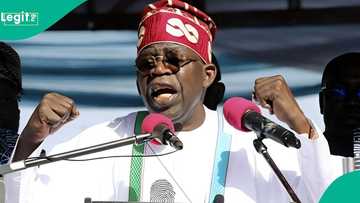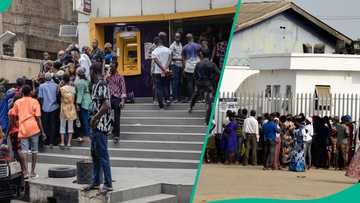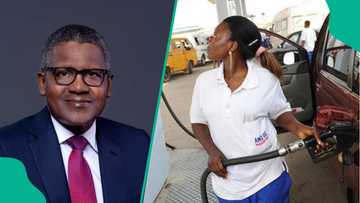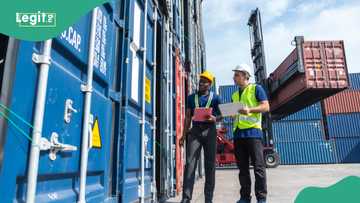FG Set To Shut Down Filling Stations After Customs Announces N400/Litre Fuel
- The Nigerian government, through the NMDRA, may close filling stations along access roads to neighbouring countries to curb petroleum product smuggling
- The Nigeria Customs Service is profiling these stations and will hand over findings to the NMDRA for appropriate action, including licence revocation or closure
- In related news, Dangote Refinery has reduced fuel prices for its distribution partners, leading to lower retail prices at filling stations across Nigeria
Legit.ng journalist Zainab Iwayemi has 5-year-experience covering the Economy, Technology, and Capital Market.
In an effort to curb the smuggling of petroleum products, there are compelling signs that the federal government, acting through the Nigerian Midstream and Downstream Petroleum Regulatory Authority (NMDRA), may be considering closing filling stations along access roads to neighbouring nations.

Source: Getty Images
As has been previously reported, the federal authorities closed more than 400 gas stations located 20 kilometres from the country's borders in 2019 due to the same problem.
The Comptroller-General of the Nigeria Customs Service, Adewale Adeniyi, who hinted at this over the weekend, said they had commenced the profiling of petrol stations located on access roads to communities that share borders with neighbouring countries, to try and curb the smuggling of petroleum products.
Although Adeniyi suggested that the findings from the profiling of filling stations would be handed over to the NMDRA for appropriate sanctioning, he added that anyone found to be involved in aiding the activities of smugglers would come under government scrutiny.
Non-compliant Nigerian filling stations could close
According to the head of Nigeria Customs, stations that were found to be non-compliant would not only be closed, but their operating licences would also be revoked.
This announcement was made on Friday, May 30, at the Nigeria Customs Training School in the Ikeja district of Lagos while displaying some confiscated PMS items.
Adeniyi, who was represented by Hussein Ejibunu, the National Coordinator of Operation Whirlwind, clarified that the goal was to identify fuel stations involved in smuggling by distinguishing those that are active from those that are moribund.
“And that is the essence of why we have to identify filling stations that are close to the border, those that are moribund, and those that are active, so that we will know which stations the Midstream and Downstream Regulatory Authority will grant licences to,” Adeniyi said.
He emphasised that the NMDRA would be contacted for any necessary action if any filling stations were found to be non-compliant.
“I have just mentioned that there are many, and those found guilty will be dealt with by the NMDRA. It’s not for Customs to handle; we are not the ones who issued their licences,” the Comptroller-General stated.
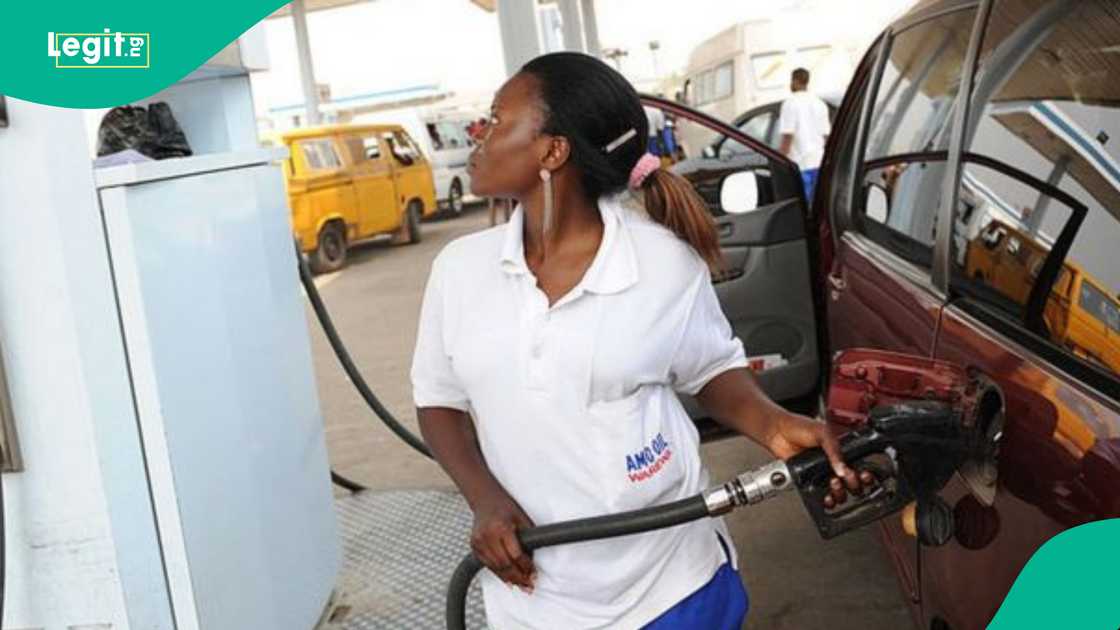
Source: Getty Images
Adeniyi provided details about the seizure, pointing out that eight vehicles used for transportation, as well as 1,577 jerrycans of PMS (25 litres each), totalling 39,425 litres, were taken into custody.
“The duty paid value of the product stands at N39.425 million, and that of the means of conveyance stands at N24 million, cumulatively amounting to N63.425 million,” he said.
Insiders in uniform aid smuggling trade - Border security expert alleges
A border security expert has described the Federal Government’s plan to shut down filling stations near Nigeria’s borders as “well-intentioned but ultimately ineffective” in the fight against fuel smuggling.
Adeyemi Isaac Adekitan, who has firsthand experience with fuel smuggling operations, told Legit.ng that it:
“Is not just a criminal act, it is an entire underground economy with well-organized operations, structured hierarchies, and a wide network of collaborators.”
“Smuggling operations function like a business, with logistics, supply chains, and ‘staff’ on payroll,” he said, noting that “complicity often extends to some members of security agencies who are supposed to enforce border laws.”
“The profit from aiding smugglers can far outweigh official salaries, creating strong incentives for corruption. Some officials are even direct participants in the trade,” Adekitan added.
He further criticised the government’s enforcement strategy within a fixed kilometer radius from the border as “impractical, particularly in vast border localities,” citing that “a filling station can be legally located 100km from the border and still act as a hub for smuggling operations.”
Expert recommends reform, intelligence over crackdowns
To effectively combat fuel smuggling while protecting legitimate businesses, Adekitan said Nigeria needs “deep structural, institutional, and attitudinal reform.” He emphasised that,
“There must be an overhaul of security agency operations at the borders, with strict accountability measures and real consequences for collusion or corruption.”
He also noted that “border communities must be reoriented through targeted economic alternatives and civic education,” explaining that “to many residents, smuggling is not a crime but a way of life” because “they share culture, language, and family ties with people on the other side of the border.”
Adekitan further stressed the importance of:
“Investing in drone technology, satellite surveillance, and community-based intelligence networks to monitor illegal fuel movement in real time.”
He cautioned that the government should “avoid blanket policies that penalize legitimate business owners” and instead conduct risk-based assessments to enforce compliance without harming local economies.
“Fuel smuggling cannot be curbed by brute-force policies alone,” he noted, calling for a multifaceted approach that addresses “both the economic incentives driving smuggling and the institutional failures enabling it.”
Adekitan, however, clarified that his opinions are personal and do not represent the views of any organisations he is affiliated with.
Nigeria Customs authorises auction of confiscated fuel
Earlier, Adeniyi had authorised the immediate auction of confiscated petrol at a discounted price of N10,000 per 25-litre jerrycan. This means a litre of the petrol would be sold at N400/litre.
The product was seized over the weekend by the agency’s task force, Operation Whirlwind, which confiscated petrol valued at over N63 million in the Lagos-Ogun axis, as reported by Daily Sun.
National Coordinator, Ejibunu, praised the seizure as a significant victory in the battle against economic sabotage during a press briefing at the Customs Training College in Ikeja, Lagos, over the weekend.
NNPC, Dangote refinery’s partners reduce costs
Legit.ng also reported that petrol price battles between Dangote Petroleum Refinery and the Nigerian National Petroleum Company Limited had led to reductions in filling station prices.
According to a statement shared via a pricing table, the new retail prices apply at the pumps of Dangote’s distribution partners across Nigeria, including MRS, Ardova, Hyde, and Optima Energy.
Editorial assistant Ololade Olatimehin provided exclusive commentary from a border security expert for this report.
Source: Legit.ng


